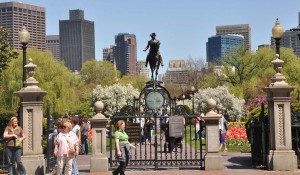
John ‘Hitman’ Martorano (a/k/a: ‘the Enforcer’, ‘the Executioner’) has confessed. He has a heart which Whitey Bulger broke by becoming an FBI snitch.
In The New York Times photo, Martorano looks like a well-fed Boston accountant of a certain age. The 20 or so killings to which he admits haven’t weighed heavily on his mug. Now redressing Bulger’s betrayal, the Executioner testified Monday for the Department of Justice.
As the late, lamented Alan Lupo wrote two decades ago: ‘Understand this city. We are about paranoia and revenge. As soon as we figure out the Latin word for “payback,” we are going to incorporate it into the city motto.’[1]
Martorano’s moan that Bulger and Steve ‘the Rifleman’ Flemmi ‘broke all the trusts, the loyalties we had’ sounds like one of those dreadful James Cagney (the punk killer) and Pat O’Brien (the boyhood pal who became a priest) vehicles.
The story one heard around Boston, among those who didn’t know, was that ‘Whitey kept the drugs out of Southie.’ The noble hood – right out of those 30s Irish-American movies.
The other right-out-of-the-movies myth was that Whitey had Sunday lunch at his mother’s in the company of his siblings. Also there was Whitey’s brother, Massachusetts Senate President William ‘Billy’ Bulger, the state’s most powerful pol from the mid-70s to mid-90s. The bad and the good presided over by Ma who allowed no business talk….
So for the formerly credulous, Martorano’s Whitey and Billy story, as the Times reported it, must have sounded like a cracked church bell:
Mr. Martorano provided a window into another intriguing aspect of the Bulger case — the role of one of Mr. Bulger’s younger brothers, William, who was a powerful politician while his brother ruled the rackets.
The Bulgers had grown up in the insular confines of South Boston as had John Connolly, the F.B.I. agent who became Whitey Bulger’s corrupt handler. Mr. Martorano recounted a conversation from decades ago in which Mr. Connolly thanked William for encouraging him to stay in school as a youth and make something of himself.
“I owe you for keeping me honest, being an FBI agent, and staying out of trouble,” Mr. Connolly told William, according to Mr. Martorano. “If there is anything I can do for you, let me know.”[2]
You can’t make this **** up. But some people who knew their audience made these stories up and had the savvy to propagate them.
Martorano’s strike at Billy Bulger would remind any juror over the age of puberty there might be more than one corrupt Bulger – something that has occurred to others covered by the Boston media over the years. As Senate President and, subsequently, Chancellor of the University of Massachusetts, Billy Bulger supped with the powerful – and the real estate moguls.
Perhaps Whitey has gone to trial not to prove he wasn’t a ‘rat’, a snitch, but to protect one of his two brothers, ‘stand up guys’ both, who’d shielded him before and during his 16 year absence – at the cost of their public careers, if not their honor. If so, Martorano has struck close to his former friend’s heart.
The perversion of values – loyalty, honor, justice – rivet attention to the Bulger saga. But is it yet another invocation of myth – this time as George V. Higgins or Ben Affleck might conceive it – artfully hiding what’s in plain sight?
Notes
1. Alan Lupo, “Troubled Waters Over Proposed Bridge,” Boston Globe, April 7, 1996, p. City3.
2. The understated treatment by the Times’ Katharine Q. Seelye borders on the offensive. She makes Martorano sound credible and Billy Bulger credulous, adjectives one would apply to neither ever. And ‘corrupt handler’? Pass the anti-freeze, please.
Recent Comments